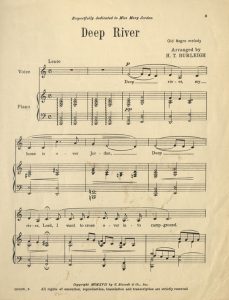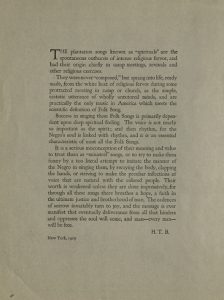H. T. Burleigh composed beloved arrangements of Black spirituals for voice and piano, and as a result became one of the most well known Black composers of the late 19th and early 20th centuries.1 As an influential proponent of the development of the spiritual as an art genre, much of his beliefs and practices legitimized Black folk music within the classical music tradition.2 In addition to a prolific compositional career, he had an extensive career as a vocalist and performed internationally.3

“Deep River” arrangement for voice and piano; by H.T. Burleigh 7
During Burleigh’s life, Black-face minstrelsy was the most prominent form of entertainment in popular culture.4 Minstrel shows are unquestionably racist and dehumanizing towards Black people, featuring a combination of expropriated folk music and dance performed by demeaning caricatures. In his edition of “Deep River,” Burleigh comments on the ability of spirituals, when performed well, to express hope, faith, and justice.5 Additionally, he acknowledges the prevalence of Blackface minstrelsy and warns against the use of the spiritual in a way that is an inappropriate imitation of vocal inflection and body language for the sake of racially extortive humor.6

H.T. Burleigh, “Deep River” preface 9
Not only were spirituals a way to uplift the Black community and counter the damage being done through minstrelsy, but their ability to empower was recognized and used to advocate for other groups as well. An example of the use of the Black spiritual as a means for advocacy is the work of Paul Robeson, who spoke out on the behalf of the lower class and other marginalized groups. 8 It seems as though the development of spirituals as art songs coincided with the practice of minstrelsy. However, minstrelsy expropriated black folk songs as a method of dehumanizing and profiting from the marginalization of Black people, while Burleigh’s work with Spirituals helped to legitimize Black folk music and empower other marginalized communities.
1 Dickinson, Peter, H. Wiley Hitchcock, and Keith E. Clifton. “Art song in the United States.” Grove Music Online. 25 Jul. 2013; Accessed 5 Oct. 2023. https://www.oxfordmusiconline.com/grovemusic/view/10.1093/gmo/9781561592630.001.0001/omo-9781561592630-e-1002240068.
2 Bell, Danna. 2018. “Link to the Library of Congress: Harry T. Burleigh—The Man Who Brought African-American Spirituals to the Classical Stage.” Music Educators Journal 104 (4): 9–11. doi:10.1177/0027432118767819.
